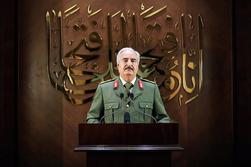 This image grab taken from a video published by the War Information Division of military strongman Khalifa Haftar's self-proclaimed Libyan National Army (LNA) on April 28, 2020 shows Haftar giving a speech, saying he had "a popular mandate" to govern the country, declaring a key 2015 political deal over and vowing to press his assault to seize Tripoli. (PHOTO / LNA War Information Division / AFP)
This image grab taken from a video published by the War Information Division of military strongman Khalifa Haftar's self-proclaimed Libyan National Army (LNA) on April 28, 2020 shows Haftar giving a speech, saying he had "a popular mandate" to govern the country, declaring a key 2015 political deal over and vowing to press his assault to seize Tripoli. (PHOTO / LNA War Information Division / AFP)
A commander battling to oust Libya’s United Nations-backed government will let the country’s oil industry re-open after an eight-month blockade that’s all but halted exports, according to US diplomats.
Khalifa Haftar gave his “personal commitment” to “allow the full reopening of the energy sector” by Sept 12, the US embassy in Tripoli said
Khalifa Haftar gave his “personal commitment” to “allow the full reopening of the energy sector” by Sept 12, the US embassy in Tripoli, the capital, said in a statement the same day. He made the pledge via an exchange of letters between his self-styled Libyan National Army and the embassy.
ALSO READ: Libya's Haftar 'accepts political initiative' after battle losses
By Sunday morning, however, Haftar and the LNA still hadn’t made any public statement about ending their blockade or allowing oil shipments to resume.
Libya, which holds Africa’s largest crude reserves, pumped 1.2 million barrels a day last year. Output has plummeted to 80,000 barrels a day after Haftar, who controls most of eastern Libya and is trying to unseat the Tripoli-based administration of Prime Minister Fayez al-Sarraj in the west, halted operations at fields and ports in his territories in mid-January.
Any increase in production could unnerve the Organization of Petroleum Exporting Countries and its allies. The group, known as OPEC+ and led by Saudi Arabia and Russia, holds a virtual meeting on Thursday to decide whether to continue easing output cuts agreed in April at the height of the coronavirus pandemic.
ALSO READ: Libya's Tripoli-based government declares ceasefire
Oil prices have since rallied to around US$40 a barrel, but are still down 40 percent this year amid concern about an acceleration of infections in some countries. Libya has been exempt from the cartel’s cuts because of its strife.
Haftar’s forces have repeatedly said that the closures will end only when there’s an agreement to distribute oil revenues more evenly between western and eastern Libya.
The blockade has cost the North African nation billions of dollars in lost revenues.
The US “is encouraged by an apparent sovereign Libyan agreement to enable the National Oil Corp to resume its vital and apolitical work,” the embassy’s statement said.
ALSO READ: Libyan forces aligned with Tripoli govt claim key air base
The NOC, also based in Tripoli, wasn’t immediately available for comment outside business hours on Saturday.
Libya has been wracked by lawlessness and war since a 2011 revolt that overthrew former dictator Muammar al-Qaddafi. The conflict has drawn in other nations including Turkey, which supports Sarraj. Russia, the United Arab Emirates and Egypt back Haftar.
Oil and gas facilities have been at the heart of the conflict, with different groups closing or sabotaging them to press their political and economic demands.
READ MORE: On Libya's front lines, Sirte is focus for regional rivalries
The shutdown of energy infrastructure has also led to widespread blackouts because electricity stations have been deprived of fuel. The power crisis has led to protests in Tripoli and in Benghazi, the biggest city in the east.


